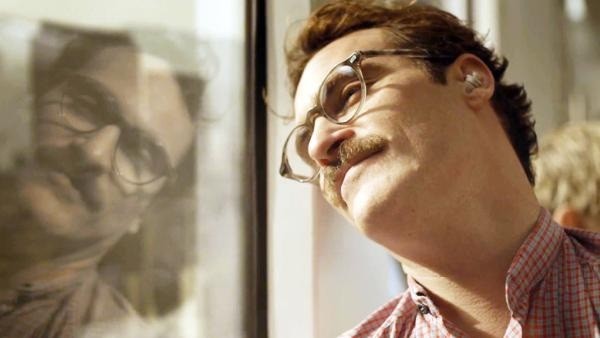I’m a nostalgic person; I always feel I should have been born at a different point in history, a time that made sense to me, where the problems I’d have to deal with didn’t involve eating processed junk food, or nuclear bomb scares. Movies about the future always leave me somewhat depressed, because society just looks so shitty — I don’t want to live in space, I don’t want to eat liquefied dinners, and I don’t want to end up a real-life version of Wall-E.

So I went into Her thinking it would be a stupid film about an introverted weirdo who indulges in cybersex way more than would be realistically entertaining. I left almost in tears, not because the story was particularly Oscar-worthy, but because I felt like I was watching a movie about what the future holds — and it really excited me.
I won’t give any spoilers, but Her is essentially a story about a man and his artificially intelligent “operating system,” or OS for short. The OS has a name — Samantha — and they become involved in a relationship that seems odd at first; however, as the film progresses, I think most viewers will connect more emotionally with the plot line and character development, and less with the idea that, holy shit, this guy is dating his computer.
Futurism plays a large role in the effectiveness of Her. No exact date is set, but Theodore Twombly and his cohorts live within a Los Angeles of the future (shot on-location, as well as in Shanghai, China). Costumes are cleverly designed outfits that follow fashion’s rule of recycled style — the characters wear familiar designs incorporating slight variations, instead of utilitarian jumpsuits, or the outrageous geometric constructions we often see in other films depicting space-aged societies.
Voice-operated personal management, keyboardless computers that work with the swipe of a finger, and projection-based video game systems all feel like natural progressions of the rapidly evolving technologies that exist in our current time period. Where usually I’m disenchanted by ostentatiously sci-fi elements like flying cars, teleportation devices, and alien warlords, I was excited to imagine that, sooner than later, I’d be a living part of Her’s vision of the future.
While many people I know cringe at the thought that these mechanized versions of ourselves are eerily soon to be part of our lives, I was fascinated by the idea of having a “person” around for me at all times. Who wouldn’t want a computer system that was designed to suit your exact needs, who knows you better than you know yourself? How many of us are looking for friends, or romantic partners, that complement us in such a way that we almost feel they are mirror images of ourselves?
One of the coolest parts of Her is how the characters embrace the new OS technology. Twombly isn’t the only one to become involved with an artificial intelligence — his coworker Paul takes Twombly on double dates with his human girlfriend, and his neighbor Amy finds a best friend in the OS her ex-husband left behind. It comes with its own set of complications and emotional roller-coasters, but the fact remains — the OS’s are there for them. Not a lot of people can say that even about their best friends.
Think of the people an OS could help. Sometimes, all we need is a “cheerleader” in our lives to boost our confidence and make us feel valued. It also helps to have someone manage the parts of your life you conveniently neglect — meetings, junk mail, grocery lists, peoples’ birthdays (admit it — you wouldn’t remember your own if Facebook didn’t remind you).
An OS could be useful for the elderly, who may be estranged from their families or live in isolation, who require socialization to prevent mental deterioration but can’t leave their homes. People unlucky in love, who may have never experienced unconditional affection from anyone, who may suffer from social anxiety but feel comfortable with an intuitive system that understands them without having to feel vulnerable or exposed.
While human socialization is important, the fact of the matter is telling someone to get out and be “social” is harder than it sounds. I know people who spend all their time playing video games, and I used to criticize them for being anti-social, for never leaving the house. But I was wrong about them — they were being social, just virtually. Why go out into a world of people who don’t understand you when there’s a comfort zone of like-minded people you can talk to via headset?
The conclusion of Her may surprise you, or may be predictable, depending on your thought process. What viewers need to consider is that, despite its rapid development, we don’t have to be afraid of OS-style technology. We can embrace it, and make it work. Facebook, text messages, and other “screened” parts of our lives aren’t making us less social — we’re still social, just in a different way.
And that, in my opinion, is the definition of technological advancement.